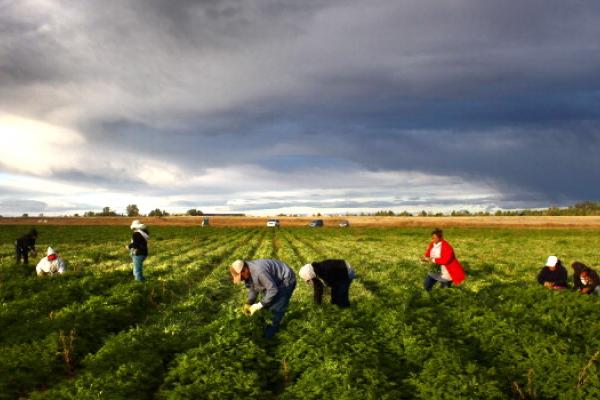About every five years the Farm Bill addresses a broad set of food and agricultural policy issues. Commodity price supports, farm credit, trade, agricultural conservation, research, rural development, energy, and foreign and domestic food programs were just some of the issues included in the Food, Conservation, and Energy Act of 2008, as the last Farm Bill legislation was officially titled.
The Farm Bill is also known for the broad range of policy stakeholders who work on it, including state organizations, national farm groups, commodity associations, conservation advocates, rural development organizations, and faith-based groups.
But even with its inclusive set of policy issues and actors, the Farm Bill is notable for one issue policymakers and advocates doesn’t touch: People who work on farms.
A large percentage (67 percent) of the 2008 Farm Bill was directed toward nutrition programs. This title included $189 billion over five years. The Farm Bill also included supports for farmers, who in 2010 had an average household income of $84,440.
For the approximately 1.1 million U.S. hired farm workers earning an average annual family income of between $17,500 and $19,999, the Farm Bill is silent.
The USDA calls U.S. hired farm workers “the most economically disadvantaged working group in the United States” and 23 percent of U.S. farm workers live in poverty, but our main legislative vehicle for shaping national farm policy leaves them out.
You can probably guess why this might be the case.
In addition to being poor, U.S. hired farm workers are overwhelmingly foreign-born. Seventy-one percent of all farm workers are immigrants — and more importantly for policy (and political) purposes — about half of all hired U.S. farm workers are in the country without authorization.
This makes the issue of agricultural labor in the United States extremely contentious.
That’s not to say that Congress doesn’t discuss farm worker issues. They do. But they are as likely to be addressed through the enforcement-focused Judiciary Committee as they are in the Agricultural Committee, where rural economy and food system issues are typically discussed and decided.
Remember Stephen Colbert’s testimony on farm workers? That was presented before a subcommittee of the House of Representatives’ Judiciary Committee even though it addresses an issue clearly relating to the nation’s agricultural economy. Just this month the third in a series of hearings on agricultural guest worker programs was held in the same Judiciary immigration subcommittee.
There have been attempts to integrate the issue of farm workers into the Farm Bill by policymakers such as Sen. Diane Feinstein. But the idea was strongly resisted by relevant Democrats and Republicans and didn’t move forward.
In spite of the contentiousness of immigration reform, farm workers may be the ideal starting point for an incremental approach to change.
Just this month at the subcommittee hearing mentioned above, subcommittee Chairman (and Republican) Elton Gallegly said, “Real world experience has shown that there are simply not enough Americans willing to work as migrant farmworkers.” Secretary of Agriculture Tom Vilsack — a former farm state governor — has also called for immigration reform to ensure that growers don’t face labor shortages.
But without effort from Farm Bill stakeholders it will difficult to integrate discussions of farm labor into agricultural policy. So far there are no public signs of that happening. This week the New York Times hosted an on-line forum inviting agricultural experts and advocates to discuss what is missing and what should be added to the Farm Bill. There was a wide range of input: Some called for larger food stamp benefits, others called for more humane treat of farm animals, organic farming was also represented in the forum.
Discussion of farm workers was absent. Isn’t it time we integrate this fundamental part of farming it into our broader discussions of agricultural policy?
Andrew Wainer is immigration policy analyst at Bread for the World Institute. This blog post originally appeared on the Institute Notes Blog.
Got something to say about what you're reading? We value your feedback!
